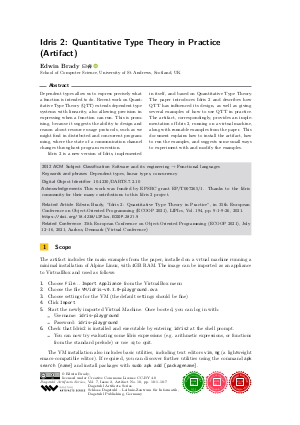Idris 2: Quantitative Type Theory in Practice (Artifact)
Author
Edwin Brady 
-
Part of:
Issue:
Special Issue of the 35th European Conference on Object-Oriented Programming (ECOOP 2021)
Part of: Volume: DARTS, Volume 7 (ECOOP 2021)
Part of: Conference: European Conference on Object-Oriented Programming (ECOOP)
Part of: Journal: Dagstuhl Artifacts Series (DARTS) - License:
 Creative Commons Attribution 4.0 International license
Creative Commons Attribution 4.0 International license
- Publication Date: 2021-07-06
Artifact Description

PDF
DARTS.7.2.10.pdf
- Filesize: 0.49 MB
- 7 pages
Document Identifiers
Subject Classification
ACM Subject Classification
- Software and its engineering → Functional languages
Keywords
- Dependent types
- linear types
- concurrency
Metrics
- Access Statistics
-
Total Accesses (updated on a weekly basis)
0Document
0Metadata
Artifact
DARTS-7-2-10-artifact-d42094219eb7956180225142cf9b728b.zip
(Filesize: 346.58 MB)
MD5 Sum:
d42094219eb7956180225142cf9b728b
(Get MD5 Sum)
Abstract
Dependent types allow us to express precisely what a function is intended to do. Recent work on Quantitative Type Theory (QTT) extends dependent type systems with linearity, also allowing precision in expressing when a function can run. This is promising, because it suggests the ability to design and reason about resource usage protocols, such as we might find in distributed and concurrent programming, where the state of a communication channel changes throughout program execution. Idris 2 is a new version of Idris, implemented in itself, and based on Quantitative Type Theory. The paper introduces Idris 2 and describes how QTT has influenced its design, as well as giving several examples of how to use QTT in practice. The artifact, correspondingly, provides an implementation of Idris 2, running on a virtual machine, along with runnable examples from the paper. This document explains how to install the artifact, how to run the examples, and suggests some small ways to experiment with and modify the examples.
Cite As Get BibTex
Edwin Brady. Idris 2: Quantitative Type Theory in Practice (Artifact). In Special Issue of the 35th European Conference on Object-Oriented Programming (ECOOP 2021). Dagstuhl Artifacts Series (DARTS), Volume 7, Issue 2, pp. 10:1-10:7, Schloss Dagstuhl – Leibniz-Zentrum für Informatik (2021)
https://doi.org/10.4230/DARTS.7.2.10
BibTex
@Article{brady:DARTS.7.2.10,
author = {Brady, Edwin},
title = {{Idris 2: Quantitative Type Theory in Practice (Artifact)}},
pages = {10:1--10:7},
journal = {Dagstuhl Artifacts Series},
ISSN = {2509-8195},
year = {2021},
volume = {7},
number = {2},
editor = {Brady, Edwin},
publisher = {Schloss Dagstuhl -- Leibniz-Zentrum f{\"u}r Informatik},
address = {Dagstuhl, Germany},
URL = {https://drops.dagstuhl.de/entities/document/10.4230/DARTS.7.2.10},
URN = {urn:nbn:de:0030-drops-140342},
doi = {10.4230/DARTS.7.2.10},
annote = {Keywords: Dependent types, linear types, concurrency}
}
Author Details
Acknowledgements
This work was funded by EPSRC grant EP/T007265/1. Thanks to the Idris community for their many contributions to this Idris 2 project.
Related Article
- Edwin Brady, "Idris 2: Quantitative Type Theory in Practice", in 35th European Conference on Object-Oriented Programming (ECOOP 2021), LIPIcs, Vol. 194, pp. 9:1-9:26, 2021. https://doi.org/10.4230/LIPIcs.ECOOP.2021.9
